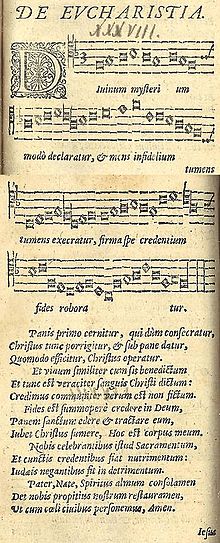Of the Father's Heart Begotten
| Of the Father's heart begotten | |
|---|---|
 The original plainsong of "Divinum mysterium" in Piae Cantiones | |
| Native name | Corde natus |
| Genre | Christmas carol |
| Text | Aurelius Prudentius, translated by John Mason Neale, Henry W. Baker, Roby Furley Davis |
| Based on | John 3:16 |
| Meter | 8.7.8.7.8.7.7 |
| Melody | "Divinum mysterium" |
| Published | 1582 |
"Of the Father's heart begotten" alternatively known as "Of the Father's love begotten" is a doctrinal hymn based on the Latin poem "Corde natus" by the Roman poet Aurelius Prudentius, from his Liber Cathemerinon (hymn no. IX) beginning "Da puer plectrum" which includes the Latin stanzas listed below.[1]
History
The ancient poem was translated and paired with a medieval plainchant melody "Divinum mysterium". "Divinum mysterium" was a "Sanctus trope" – an ancient plainchant melody which over the years had been musically embellished.[2] An early version of this chant appears in manuscript form as early as the 10th century, although without the melodic additions, and "trope" versions with various melodic differences appear in Italian, German, Gallacian,[clarification needed] Bohemian and Spanish manuscripts dating from the 13th to 16th centuries.[2]
"Divinum mysterium" first appears in print in 1582 in the Finnish song book Piae Cantiones, a collection of seventy-four sacred and secular church and school songs of medieval Europe compiled by Jaakko Suomalainen and published by Theodoric Petri.[3] In this collection, "Divinum mysterium" was classified as "De Eucharistia", reflecting its original use for the Mass.[4]
The text of the "Divinum mysterium" was replaced by the words of Prudentius's poem when it was published by Thomas Helmore in 1851. In making this fusion, the original metre of the chant was disturbed, changing the original triple metre rhythm into a duple metre and therefore altering stresses and note lengths. A later version by Charles Winfred Douglas (1867–1944) corrected this using an "equalist" method of transcription, although the hymn is now found in both versions as well as a more dance-like interpretation of the original melody.[2]
Translations
There are two translations commonly sung today; one by John Mason Neale and Henry W. Baker, and another by Roby Furley Davis.
Neale's original translation began "Of the Father sole begotten" in his Hymnal Noted (London, 1851), and contained only six stanzas (of the original Latin poem's thirty-eight).[5] It was Neale's music editor, Thomas Helmore, who paired this hymn with the Latin plainsong. Neale's translation was later edited and extended to nine stanzas by Henry W. Baker for Hymns Ancient and Modern (London, 1861; below).
Dissatisfied with Neale's translation, Roby Furley Davis (1866–1937), a scholar at St John's College, Cambridge, wrote a new version for The English Hymnal of 1906. Davis was assistant master at Weymouth College and a scholar of the works of Tacitus, especially his book on Agricola.[6] This version was also used in the popular Carols for Choirs series by David Willcocks.[4]
Text and translations
| Latin text by Prudentius (born 348)[7] |
Translation by Roby Furley Davis for The English Hymnal (1906)[8] |
Translation by J. M. Neale, extended by Henry W. Baker (1851/1861)[9] |
|---|---|---|
Corde natus ex parentis |
Of the Father's heart begotten, |
Of the Father's love begotten, |
Ipse iussit et creata, |
By His Word was all created |
At His Word the worlds were framèd; |
Corporis formam caduci, |
He assumed this mortal body, |
He is found in human fashion, |
O beatus ortus ille, |
O how blest that wondrous birthday, |
O that birth forever blessèd, |
Psallat altitudo caeli, |
Sing, ye heights of heaven, his praises; |
O ye heights of heaven adore Him; |
Ecce, quem vates vetustis |
This is He, whom seer and sibyl |
This is He Whom seers in old time |
Macte iudex mortuorum, |
Hail! Thou Judge of souls departed; |
Righteous Judge of souls departed, |
Te senes et te iuventus, |
Now let old and young uniting |
Thee let old men, Thee let young men, |
Tibi, Christe, sit cum Patre |
[stanza omitted] |
Christ, to Thee with God the Father, |
Fluminum lapsus et undae |
Let the storm and summer sunshine, |
[stanza omitted] |
See also
References
- ^ Translations from Prudentius by Francis St. John Thackeray (1890)
- ^ a b c Raymond F. Glover, The Hymnal 1982 Companion: Service Music and Biographies, Volume 2 (Church Publishing, Inc., 1994), ISBN 978-0-89869-143-6 pp. 81–83
- ^ Jeremy Summerly, Let Voices Resound: Songs from Piae Cantiones, Naxos 8.553578
- ^ a b Willcocks, D. (ed.), "Of the Father's heart begotten" in Carols for Choirs 2 (London: Oxford University Press), 128–133.
- ^ Collected Hymns, Sequences and Carols of John Mason Neale (1914)
- ^ P. Corneli Taciti Agricola, edited with introduction, notes, and critical appendix by Roby F. Davis, B.A., formerly scholar of St John's College, Cambridge, assistant master at Weymouth College. Methuen & Co. London. 1892
- ^ "Corde natus ex parentis", Hymns and Carols of Christmas, accessed 26 November 2010
- ^ "Of the Father's heart negotten", Hymns and Carols of Christmas, accessed 26 November 2010
- ^ "Of the Father's love begotten", nethymnal.org, accessed 29 May 2015
External links
- "Hymn 82 'Of the Father's love begotten'". Hymnal 1982: According to the use of the Episcopal Church. hymnary.org. Retrieved 26 March 2020.
- "Of the Father's heart begotten" (Corde natus ex Parentis) (Douglas Brooks-Davies), Choral Public Domain Library
- Of The Father's Heart Begotten (arr. David Willcocks) sung by the Ely Cathedral Choir

